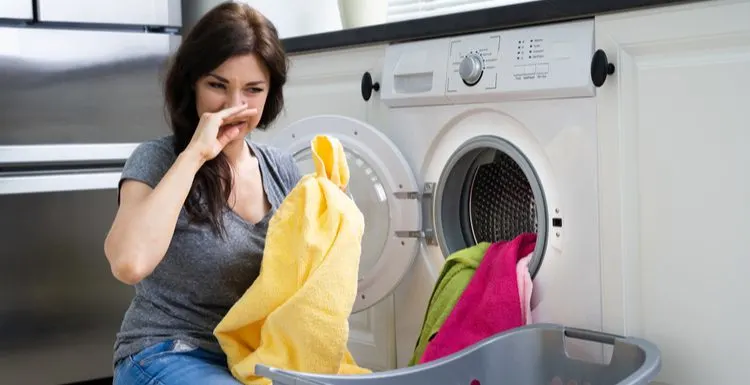Why does my washing machine smell? And is there something easy I can do to fix it?
If you’re asking either of these questions, you’re in the right place. Read on to learn how to get your washing machine smelling clean.
If you’ve ever taken out a clean load of laundry and found that it didn’t smell clean, you might have a problem with your washing machine.
There are several reasons your washing machine smells, but luckily it won’t require you to buy a whole new appliance.
We partnered with Networx to help you find local appliance repair techs. Click to below to get a FREE quote.
What Causes Washing Machine Smell?
Your washing machine smells due to mildew, mold, and bacteria growing in the soap dispensers. Mildew grows because of:
- Body oil, dirt, and hair from your clothes
- Soap scum from the detergent
- Standing water after the last spin cycle
Cleaning your washing machine regularly will prevent mildew and its related smells.
How to Eliminate Washing Machine Smells
While it might seem like the washing machine cleans itself since you’re adding detergent to the water, it doesn’t work that way.
You need to clean it to prevent mildew buildup and keep your clothes lasting longer.
Step 1: Clean the Soap Dispensers
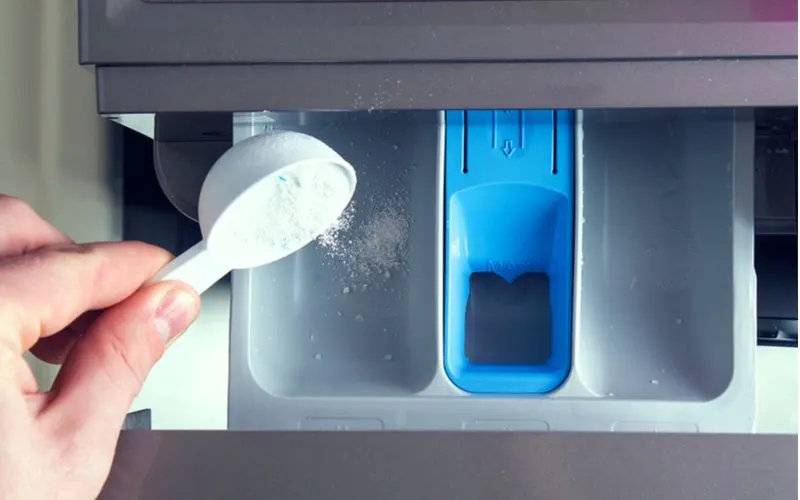
Olya Detry/Shutterstock
Understandably, the places you put detergent and fabric softener get gunked up, so the easiest step to take is to clean these sections.
Make a simple paste out of baking soda and water to scrub the residue off of the dispensers. Use an old toothbrush to reach these areas. Pipe cleaners and Q-tips are also effective at dislodging buildup.
Step 2: Clean the Seal
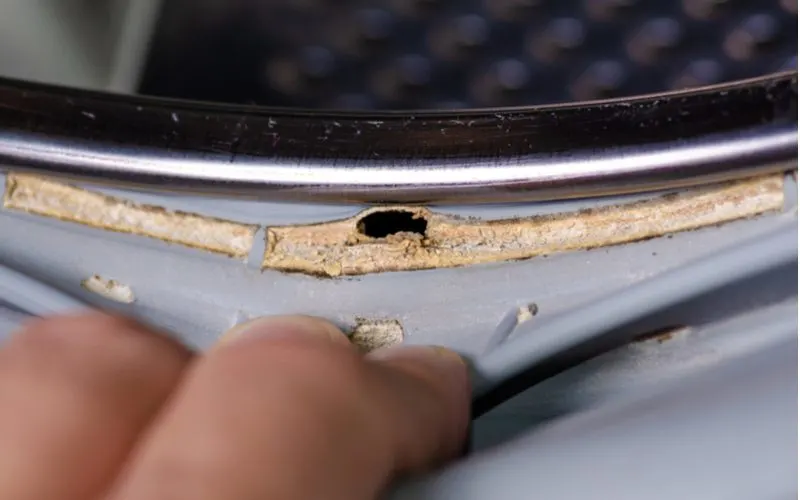
Kabardins Photo/Shutterstock
The seal on front-loading washing machines gets exposed to water and detergent, which means it’s a breeding ground for bacteria and mold. You can use hot, soapy water and a rag to clean the rubber seal between washes.
If you have mold on the seal, you can use a mix of three parts bleach and one part water. Spray it onto the seal and let it sit for a few minutes before wiping it away with a rag.
Step 3: Clean the Drum
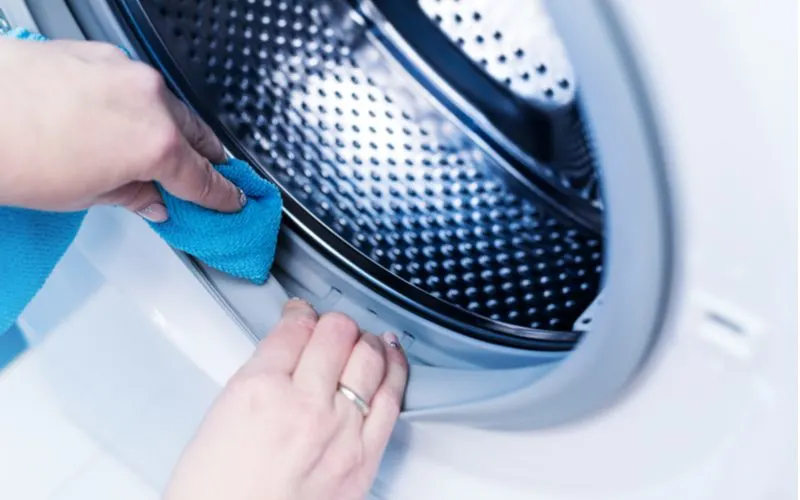
Photopixel/Shutterstock
Your clothes might come out clean from the washing machine, but that doesn’t mean the machine is cleaning itself. Each cycle leaves dirt, hair, and other contaminants in the washer, so you need to wipe it out regularly.
Before taking consistent care of your washing machine drum, deep clean it using a brush vacuum attachment. Make sure the drum is completely dry, then run the brush over the interior cylinder.
Once you vacuum out the dry debris, the cleaning cycles will run more effectively. They’ll be able to get into areas of the drum that the brush couldn’t reach. But eliminating the dry portions will ensure they don’t settle back into your machine’s crevices.
Step 4: Run Cleaning Cycles
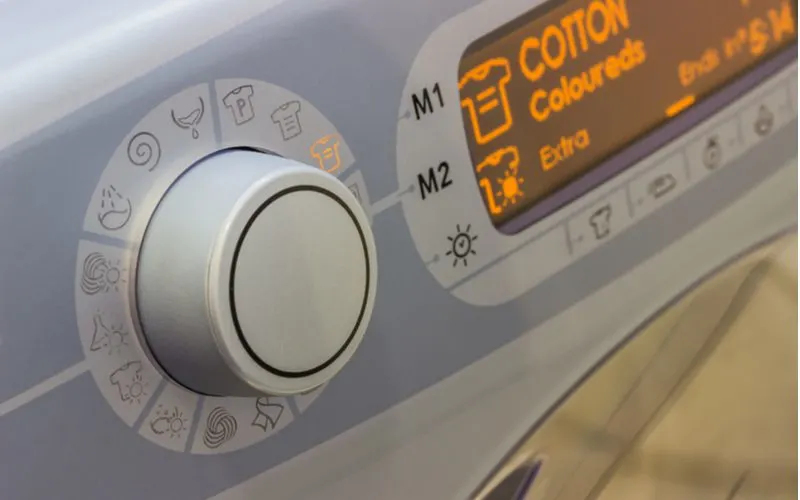
Serato/Shutterstock
Use bleach for your first cleaning cycle to kill the bacteria and sterilize the machine.
Set the washer to the hottest water temperature and add four cups to a top-loading machine or two cups to a front-loading machine. Let the drum fill and agitate so the bleach gets mixed into the water.
Stop the cycle and let the bleach sit in the drum for about 30 minutes. Resume the cycle and run an additional rinse at the end to remove the bleach. You might also want to leave the door open until you do your next load of laundry to ensure it dries out completely.
Using white vinegar and water for a cleaning cycle will further deodorize your washing machine. It also removes any hard water residue or remaining bacteria.
This cycle is similar to the bleach cycle to clean the drum. Vinegar is the only thing you need to add to this cycle since you’ve already sterilized the machine with bleach.
Use the hottest water setting. Add four cups of white vinegar to a top-loading machine or two cups to a front-loading machine. After the drum fills with water and stirs the vinegar in, stop the cycle and let it sit for 30 minutes.
Once the cycle completes, you’ll notice there’s no odor in your machine. If you can still smell the vinegar, don’t worry about eliminating that smell. It will dissipate naturally.
If nothing else, the clothes and detergent you add to the next load will overpower any remaining vinegar scent.
Things to Consider
The steps above are effective at removing washing machine smells, but there are also things to consider to prevent the smells in the first place.
- Run a vinegar cleaning cycle regularly. Doing this once a month can keep your machine clean enough that mildew won’t have a chance to grow. Even so, it’s a good idea to deep clean your machine with bleach every six months.
- Change the temperature of the water. Many people use hot water to wash clothes because it kills bacteria and sanitizes them. It’s more efficient to use cold water for laundry. You’ll save money on your utility bills and positively impact the environment.
- Use the right detergent. Some machines can’t properly dissolve powdered detergent, so your machine won’t get clothes as clean and will develop soap scum quickly. Check your user manual to make sure you’re washing clothes correctly.
- Keep the drum dry. Remove clothes from the washer as soon as the cycle finishes. Letting them sit will allow mold to grow. Leave the door open after your last load so the drum can dry out. Keeping the lid closed after a cycle will leave standing water.
Frequently Asked Questions
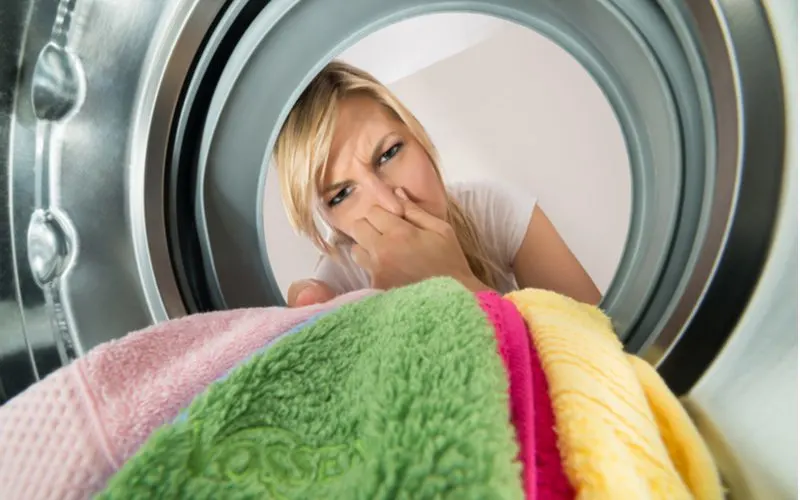
Andrey_Popov/Shutterstock
Learning how to clean your washer doesn’t mean you know why your washing machine smells in the first place. These answers will help you understand.
Why Does My Washing Machine Smell?
Because your washing machine uses water and heat to clean clothes, it’s a prime spot for bacteria to flourish. Mold and mildew can grow in areas that don’t dry out completely after a cycle.
Using the wrong detergent can leave soap scum in your machine, which encourages bacteria to grow. Not letting the drum dry out after each use can also allow mildew to spread. Cleaning your machine regularly will prevent this problem.
Washing machine smells don’t always originate from the machine. Buildup on the inlet screens, dry p-traps, clogged laundry drains and roof vents can also create bad odors. Professionals can help eliminate these problems.
How Often Should I Drain My Washing Machine?
Bacteria thrive in moisture and humidity. Draining your washing machine periodically can prevent this problem.
Not draining your machine can keep your clothes from getting clean and can cause odors. If you clean your machine regularly with the steps above, you only need to drain your washer every six months.
Turn off the power to your machine and unplug it from the outlet. Tape the cord to the top of the machine so it won’t get wet during the draining process.
Disconnect the drainpipe from the standpipe and put it in a bucket so the water can escape. If your washing machine has a filter, clean it with soap and warm water while the water drains.
Why Does My Washer Drain Smell Like Sewage?
The debris that your washing machine removes from clothes can clog in the drain. These clogs block the pipe so gas can’t escape, which causes a foul odor.
Bacteria can also grow on the material, and when water pushes past, it will cause the smell to waft into the machine. If your washing machine smells like sewage, the problem is most likely in the standpipe.
This is what your drainpipe feeds into so the water can enter and leave your machine. It leads out to the main water line, so it’s best to call a professional to fix this problem.
When to Call a Pro
The steps above are things you can do yourself to eliminate washing machine smells. But if you try these solutions and your machine still has an odor, you need to call a pro.
Other problems can make your washing machine smell. Limestone can accumulate on the inlet screens that filter the water entering your machine.
While it’s possible to remove them yourself and soak them in vinegar to break down the residue, it’s best to have a professional do it for you. You’ll find p-traps installed on every drain in your home to trap debris and prevent clogs.
A dry p-trap connected to your washing machine will trap gases and make it smell like the sewer. A plumber will ensure your p-trap is correctly installed and keep it moist to prevent odors. A clogged vent trap can also cause your washing machine to smell.
This pipe lets air enter and gases escape. If there’s a clog in the trap, the gases and related odors will back up into your machine. Because these pipes release from your roof, it’s safest to call a professional to remove clogs.
If you like the idea of doing things yourself in the laundry room, consider tackling other hacks. Leave these potentially dangerous deep cleanings to a professional.
We partnered with Networx to help you find local appliance repair techs. Click to below to get a FREE quote.
So, Why Does My Washing Machine Smell?
Cleaning your washing machine’s seal and drum, as well as running bleach and vinegar cycles, can help eliminate smells.
If you still have lingering washing machine smells after taking these steps, call a professional to get your laundry cleaned again.

